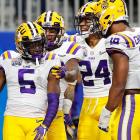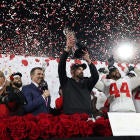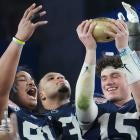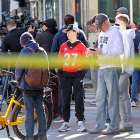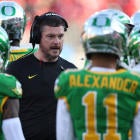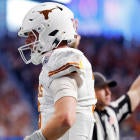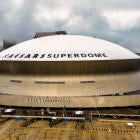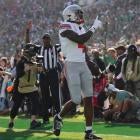NEW ORLEANS -- LSU defensive coordinator Dave Aranda is one of the most well-respected and well-compensated assistant coaches in the country. There is no clause in his contract that requires a certain number of yards or points allowed to unlock his $2.5 million annual salary, but Aranda knows that there's a set of expectations in place when it comes to LSU and the defensive side of the ball.
One of the great challenges of Aranda's second season working under Ed Orgeron has been to find a way to meet those expectations opposite an offense that has been scoring more and scoring faster than any in program history. The roster is packed with future NFL Draft picks, much like the LSU defenses of the Les Miles era, but those future pros are spending way more time on the field and less time on the sideline thanks to an offense that's scored 67 of its 85 touchdowns (78.8 percent) on drives of 3 minutes or less.
It's a struggle for the defense because not only are its players spending more time on the field, they are being asked to protect large leads. Previous LSU defenses were tasked with being the most dominant unit in the game. In 2019, they aren't even the most dominant unit on their own team.
"You're winning by 30 points in the second quarter, and the fire that you started the game with is evaporating. Right? You're catching players looking up in the crowd, you're catching glimpses at the scoreboard, you're catching smiles and laughter and these things," Aranda said. "I think there is a lot of human nature that is in all of that. I feel like that's where I haven't done as good as I could have been. I think that's still a fight. That's still something that has to be talked about, brought up and taught. We're hoping that that stuff continues. But like I said, that's a good problem to have."
At the start of the season, the Tigers were winning with offensive success unlike anything anyone had ever seen or expected, so any questions about defensive excellence were mostly below the fold. But they were there as LSU struggled to stop Texas in the second half of a 45-38 win and later allowed Vanderbilt to score the same amount in a 66-38 blowout.
Consistency just wasn't there across four quarters from LSU's defense, and people started to take notice. What Aranda called "the noise" reached the locker room by the time the Ole Miss game came around in early November, and it contributed to the worst defensive performance of the season.
"I think that affected some of the play in that game, or I allowed it to affect because I didn't meet with the guys, quiet them down, get them to forget to block out any noise, and [say], 'Let's just focus on finishing the game,'" Aranda said on Saturday. "I think guys were concerned about, 'Hey, this is what they're saying, this is what we're doing, why is this happening?' and this and that. So I feel that was a failure on my part to quiet that down."
One week after an emotional win against Alabama -- LSU's first since the BCS Championship Game loss in New Orleans eight years ago -- LSU was carved up by Ole Miss freshman quarterback John Rhys Plumlee in a 58-37 win. The headline nationally was LSu quarterback Joe Burrow's 489 yards passing and five touchdowns, but inside the locker room after the game, the defensive players were frustrated by allowing the Rebels 614 yards of offense with more than 400 coming on the ground.
"Even after that game, we were in the locker room as a defense and we were totally upset and frustrated," LSU linebacker K'Lavon Chaisson said. "We made them stop the music. We were just all in distraught. And Coach O had to remind us, man, we won the game. That's the overall goal of the game is to win. No matter how many points -- you [can win] by one or 30 -- you won the game.
"That's something that we had to take in, but we knew as defense: we go through another game like that, offense can't save us like that every game."
| LSU | Clemson | |
|---|---|---|
Scoring offense | 48.9 ppg (1st) | 45.3 ppg (4th) |
Total offense | 546.2 ypg (1st) | 538.4 ypg (3rd) |
| Scoring defense | 21.6 ppg (29th) | 11.5 ppg (1st) |
Total defense | 339.9 ypg (29th) | 264.1 ypg (2nd) |
That moment was a turning point for an LSU defense that has to turn in one of its best performances of the season in order to secure the program's first national championship since the 2007 season.
"I think after that, I got a better grip and an understanding of what needs to happen on the sideline consistently," Aranda said. "And then I think our players kind of understood where everything is in terms of blocking out the noise, focusing in on the details, doing their 1/11th. I'm going to do my job, trusting that you're going to be accountable for your job. When we do that, we play team defense. I think there were elements of that prior to that game. I think that there was a collapse of that in that game, and we've been able to bring it back to a degree."
The specifics of that Ole Miss game, particularly LSU's struggles against a mobile quarterback, have been mentioned heading into the matchup with No. 3 Clemson. Quarterback Trevor Lawrence, like Deshaun Watson before him, has become more of a factor in Clemson's rushing attack as the stage gets bigger. Lawrence's running sparked the comeback in Clemson's win against Ohio State, and No. 1 LSU absolutely knows it's going to be a factor in Monday night's College Football Playoff National Championship.
But since that Ole Miss game, Aranda and the LSU defense have played at an elite level that better compliments its historic offense. LSU held Texas A&M to just seven points and Georgia to 10 in the SEC Championship Game. Then, the defense started the Peach Bowl with three straight three-and-outs to do its part in Burrow's record-setting win against Oklahoma.
LSU's defense is healthy, fully adjusted to life opposite the spread offense and ready to prove that it's living up to the program standard against Clemson on Monday night in New Orleans.







